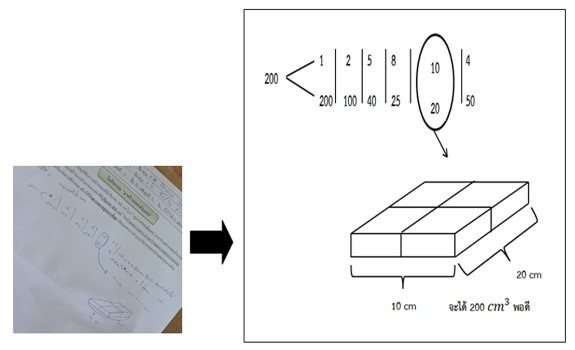Development of Reasoning Habits Through Lesson Study and Open Approach Teaching Practices
Abstract
This research aimed to investigate the development of reasoning habits after introducing the lesson study and open approach to teaching practices. A total of eight 6th-Grade students from Chumchon Ban Kaeng Khro Nong Phai School, Chaiyaphum province, Thailand were purposively selected to participate in this research. This is because they have attended the mathematics lessons using the innovation of lesson study and open approach. A qualitative research design was employed using five types of research instruments, namely 13 lesson plans, observation records, field notes, interview protocol, and students’ worksheets. Data were analyzed using content analysis and categorizing the students’ reasoning habits according to the National Council of Teachers of Mathematics’ framework. The results revealed that students can analyze a problem situation by making reasoning conjectures, applying previously learned concepts, seeking patterns and relationships as well as making representations. Besides, they can also implement a strategy by using mathematical operations to solve problems. Moreover, students can seek and use connections to discover the linkage between how to solve the problems differently and identify the relationship of the approach used to get the same answer. Finally, the students can reflect on a solution as they can find different ways to solve the problems after considering the reasonableness of a solution, interpret a solution, justifying reasons to support or validate how to solve the problems, as well as generalize a solution. The overall results are successfully contributed to the importance of lesson study and open approach teaching practices in terms of enhancing 6th-Grade students’ reasoning habits.
References
Boyd, P., & Ash, A. (2018). Mastery mathematics: Changing teacher beliefs around in-class grouping and mindset. Teaching and Teacher Education, 75, 214-223. https://doi.org/10.1016/j.tate.2018.06.016
Eddy, C. M., & Inprasitha, M. (2012). US-Thailand research network to advance the teaching and learning of algebraic reasoning research proposal. Khon Kaen, Thailand: Khon Kaen University.
Inprasitha, M. (2011). One feature of adaptive lesson study in Thailand: Designing a learning unit. Journal of Science and Mathematics Education in Southeast Asia, 34(1), 47-66.
Inprasitha, M. (2014). Processes of problem solving in school mathematics. Center for Research in Mathematics Education (CRME), Faculty of Education, Khon Kaen University, Thailand: Pen printing. [in Thai]
Inprasitha, M. (2016). A report on the synthesis of academic management models in educational institutions using the innovation of lesson study and open approach. Khon Kaen, Thailand: Klangnanavittaya Press.
Kaur, A., Awang Hashim, R., & Noman, M. (2014). Teacher autonomy support: Does it hinder motivation among Thai student? Malaysian Journal of Learning and Instruction, 11, 271-189.
Mathnasium of Littleton. (2016). News from Mathnasium of Littleton: Understanding mathematical reasoning. Retrieved from https://www.mathnasium.com/littleton-news-understanding-mathematical-reasoning.
Meyer, R. D., & Wilkerson, T. L. (2011). Lesson study: The impact on teachers’ knowledge for teaching mathematics. In L. C. Hart, A. S. Alston, & Murata (Eds.), Lesson study research and practice in mathematics education (pp. 15-26). London, UK: Springer Science + Business Media. https://doi.org/10.1007/978-90-481-9941-9_2
National Council of Teachers of Mathematics (NCTM). (2009). Focus in high school mathematics reasoning and sense making. Reston, VA: National Council of Teachers of Mathematics.
Nohda, N. (2000). Teaching by open-approach method in Japanese mathematics classroom. Proceedings of the Conference of the International Group for the Psychology of Mathematics Education (PME), Hiroshima, Japan, July 23-27, 1, ERIC ED 466 736.
Oslington, G., Mulligan, J., & Van Bergen, P. (2020). Third-graders’ predictive reasoning strategies. Educational Studies in Mathematics, 104, 5-24. https://doi.org/10.1007/s10649-020-09949-0
Steffe, L. P., & Thompson, P. W. (2000). Teaching experiment methodology: Underlying principles and essential elements. In R. Lesh & A. E. Kelly (Eds), Research design in mathematics and science education (pp. 267-307). Hillsdale, NJ: Erlbaum.
Tall, D. (2008). Using Japanese lesson study in teaching mathematics. The Scottish Mathematical Council Journal, 38, 45-50.
Tan, S. F., Lim, C. S., & Chew, C. M. (2017). Changes in teachers’ reflection after lesson study process. Malaysian Journal of Learning and Instruction, Special Issue, 145-172.
Wang-Iverson, P., & Yoshida, M. (Eds.). (2005). Building our understanding of lesson study. Philadelphia, PA: Research for Better Schools.


This work is licensed under a Creative Commons Attribution 4.0 International License.
Copyright for this article is retained by the author(s), with first publication rights granted to the journal.
This is an open-access article distributed under the terms and conditions of the Creative Commons Attribution license (http://creativecommons.org/licenses/by/4.0/).








1.png)

















